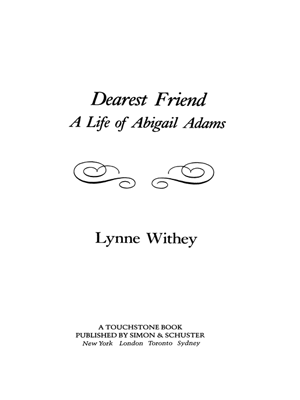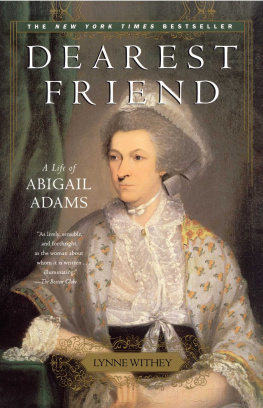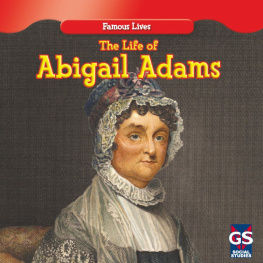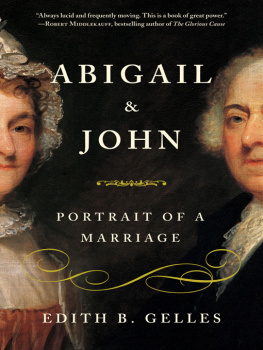


TOUCHSTONE
Rockefeller Center
1230 Avenue of the Americas
New York, NY 10020
www.SimonandSchuster.com
Copyright 1981 by The Free Press
All rights reserved, including the right of reproduction in whole or in part in any form.
This Touchstone Edition 2002
TOUCHSTONE and colophon are registered trademarks of Simon & Schuster, Inc.
For information about special discounts for bulk purchases, please contact Simon & Schuster Special Sales: 1-800-456-6798 or business@simonandschuster.com
Manufactured in the United States of America
10 9 8
The Library of Congress has cataloged The Free Press edition as follows:
Withey, Lynne
Dearest friend.
Bibliography: p.
Includes index.
1. Adams, Abigail, 1744-1818. 2. Adams, John, 1735-1826. 3. PresidentsUnited StatesWivesBiography. 1. Title.
E322.1.A38W56
973.440924(B) 80-70694
AACR2
eISBN-13: 978-0-7432-3312-5
ISBN-10: 0-7432-2917-7
ISBN-13: 978-0-7432-3443-6 (Pbk)
ISBN-10: 0-7432-3443-X (Pbk)
www.simonspeakers.com
For Michael
Contents
Preface
Abigail Adams was a tiny woman, little more than five feet tall, with dark hair, piercing dark eyes, and a forceful personality that belied her size. Quiet and reserved as a child, she nonetheless displayed a brilliant mind and fierce determination even then. As she matured, these qualities broke through her quiet exterior and she became voluble and outspoken, never afraid to assert her opinions whether in the company of friends, family, or heads of state.
To the modern observer, she is maddeningly contradictory. On the one hand, she was a fiery revolutionary, denouncing British tyranny in blistering rhetoric. She refused to be intimidated by the specter of British attack, even as she could hear the cannon and see the smoke of nearby battles; she raised four children, managed a farm, and conquered her intense feelings of loneliness and depression while her husband spent years away from her serving in the Continental Congress and negotiating with European powers. Her husband, John, called her a heroine for her courage, and indeed she was. Yet after the war she turned into a reactionary; she denounced all opposition to the new federal government as dangerous, blamed all political dissent on foreign influence, and advocated the suppression of freedom of the press.
She was just as contradictory in other ways too. She argued for improved legal rights and education for women long before they became popular issues; but she always believed that a womans place was in the home and, as she got older, became more and more obsessed with delicacy and moral purity in women. She professed to hate politics, and yet obviously thrived in her role as a politicians wife. Even in her relationships with her family, she displayed contradictory behavior. She tried to control the lives of everyone around her but instilled in her children a spirit of independence that made them resistthough not always successfullyher overwhelming influence. They often showed signs of resenting her interference in their lives, but they were also deeply attached to her. Despite her sometimes overbearing personality, she was a loving and generous woman. Her concern for her family and friends knew no bounds, and they, in turn, loved her unreservedly.
One may try to explain away the contradictions in Abigails life by pointing out that she was essentially conservative, that as a feminist she was limited by the constraints of her times, that her professed distaste for politics was mostly talk. There is some truth in all these statements, but they are hardly sufficient to explain Abigails complex personality. How does one explain a conservative who advocated independence for America and equality for women?
Abigail herself would not have appreciated having anyone try to force a pattern of consistency on her life. She was the first to admit that she was temperamental and changeable; she also believed that anyone with an independent mind would not ever try to be consistent. And she was nothing if not independent.
On some things, however, she never wavered. She was, throughout her life, temperamentally and philosophically conservative, despite her outspoken advocacy of the American Revolution. In general, she feared revolution; she valued stability, believed that family and religion were the essential props of social order, and considered inequality a social necessity. But at the same time she abhorred injusticewhether it was British control of the American colonies, womens subjection to their husbands, the enslavement of black people, or the antiquated laws that kept European peasants from owning their own land. These were all injustices, in her mind, that could be ended without threatening the underlying social order.
The American colonies rebelled against England, she believed, because their continued subjection to British rule was neither just nor necessary. The formation of a new American government seemed to her a perfect opportunity for ending womens inferior legal status and for abolishing slavery. But she saw no reason to change basic social relationships or to introduce democracy. People who did advocate such changes, she believed, were guilty of undermining the government and betraying the ideals of the Revolution.
She approached the issue of womens rights from a similar perspective. She believed that women were the intellectual equals of men and had a right to an education; she hinted that they also had the right to vote. She talked about the tyranny of men and compared womens condition to Egyptian bondage. Yet she also believed that women by nature were fundamentally different from men and were best suited to be housewives and mothers. To her way of thinking there was nothing inconsistent about those views. Women had a clearly defined role caring for their homes and families, just as men had their role as breadwinners. Families needed both to survive, and families were the cornerstone of society. Better education and legal independence would do nothing to change this situation; indeed, education would only make women better wives and mothers.
But, as clear as these points seemed to Abigail, the issues she raised about womens rights did potentially undermine their traditional role, a dilemma that she herself could never quite escape. Although she never actually stepped outside her role as wife and mother, she carried it to its limits. She managed all the family property and investmentsincluding buying land, planning additions to houses and farm buildings, hiring and firing laborers, contracting with tenants, and supervising farm work. Most of these things were accomplished without Johns advice and in many cases without his knowledge. She often disagreed with him on the best way to invest their money, and she generally got her way. She also served as Johns unofficial, unpaid, but most influential political adviser.
Abigail often felt uneasy about the extent to which she stepped out of womens traditional sphere. She constantly asked for Johns advice about farm matters, usually without any response except his assurances that she managed brilliantly without his help. She admired women who achieved success in fields generally reserved for men, but she expected them to sacrifice some of their femininity as a result. Even more significant, she admired women who were more conventionally feminine than she was. She worried, for example, that she would not live up to Martha Washingtons example as First Lady, although by all accounts Abigail was a far more interesting person. She admired in her own daughter those qualities that were most unlike herself: her quiet, demure manner, her selflessness, her delicate beauty. Late in life, when she compared two of her granddaughters who were entering their teens, she praised the one who was feminine and self-effacing while criticizing the other, who was stubborn and contentious, even though she admitted that the second girl was much more like herself as a child.
Next page








